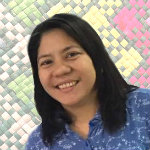
Marilou, Analou. Marju, Susan, Gina. Dita, Lina. Evelyn, Mary Jean.
These names may not ring a bell as much as “si Aida o si Lorna o si Fe” for OPM fans of a certain age.
To many fishers in different parts of the country, however, these 9 names represent some of the bold women who use their assets – knowledge, skills, resourcefulness – to make sure there will always be food on their families’ tables. (READ: Women, the sea, and food security)
Individual stories
Marilou Tria of Lubang in Occidental Mindoro and Analou Lumapguid of Ayoke in Cantilan, Surigao del Sur, are village leaders who have organized their neighbors, relatives, and friends into savings clubs.
In their remote island communities, these local organizations have provided a lifeline and raised thousands of pesos for family expenses, emergencies, and micro investments. (READ: The women of Baruya: Invisible food producers)
Marjurie Abella, the municipal agricultural officer of Ayungon, Negros Oriental; and Susan Cataylo, the municipal disaster risk reduction and management officer of Pilar in the Camotes Islands in Cebu, have been initiating campaigns geared at empowering fishers in their community.
Born on the same day, although decades apart, they run behavior change campaigns that inspire fishers to use registered gear and boats in designated fishing grounds outside marine protected areas. As department heads, they are always busy coordinating with local and national officials, fisheries leaders, and project partners.
They have also delivered speeches before international audiences about their experiences in mobilizing and climate-proofing communities, and still find time – as devoted mothers – to attend to their families’ needs.

Gina Barquilla, who serves as the municipal environment and natural resources officer of Del Carmen in Siargao Island, Surigao del Norte, leads a team comprised mostly of men.
Gina has been apprehending illegal fishers despite threats to her life. In 2016, the Department of Environment and Natural Resources in the Caraga region recognized her dedicated service which she accomplished while dealing with the challenges of being a single parent to 5 children.
Meanwhile, Catalina "Lina" Cabrera and Expedita "Dita" Acibo chair the Fisheries and Aquatic Resources Management Councils in the municipalities of Manjuyod and Bindoy in Negros Oriental.
These local bodies provide critical inputs to fisheries legislation, managing marine sanctuaries, rights and duties of fishers, and conservation measures. The leadership of these women have won recognition – Lina was a finalist in the Ocean Heroes Awards for Tañon Strait in 2017 while Dita steered her group to become the national winner for outstanding MFARMC in 2015.
Mayor Evelyn Fuentebella of Sagnay, Camarines Sur, and Mayor Mary Jean Te of Libertad, Antique, are two local officials who do not allow the remoteness or income class of their municipalities to hinder them from pursuing what they believe is beneficial for their constituents. Executive support comes in the form of budget allocation for fisheries management, staff development, and personally rallying residents to safeguard their marine resources. After all, healthier ecosystems mean more and bigger fish, a better quality of life for families, and more economically vibrant communities.
Gender equality
Their stories of meaningful participation in developing the fisheries sector affirm the need for gender equality. Traditionally, women have been relegated to lower levels of the value chain as vendors and fish processors, while men occupy the first level as fishers. (READ: Closing the gender gap in agriculture)
This is slowly changing, with more women taking on major roles such as fish catch and survey enumerators, savings club officers, and conservation enterprise managers. Many are also moving on from record-keeping, food preparation, and organizational housekeeping tasks to assume leadership positions in policy development, planning, and governance. (READ: Women and organic farming: Ending hunger one garden at a time)
These are just a few of the women changing our fishing seascapes forever. Thousands more in their coastal communities are working actively with the men in their families and neighborhoods, so that there will be more food and more secure families well into the future. – Rappler.com
May Blanco is the senior manager for gender integration and fisheries organizational and institutional development in the Philippine office of international conservation organization Rare, which is promoting sustainable management of municipal waters and responsible fishing behavior among Filipino fishers.